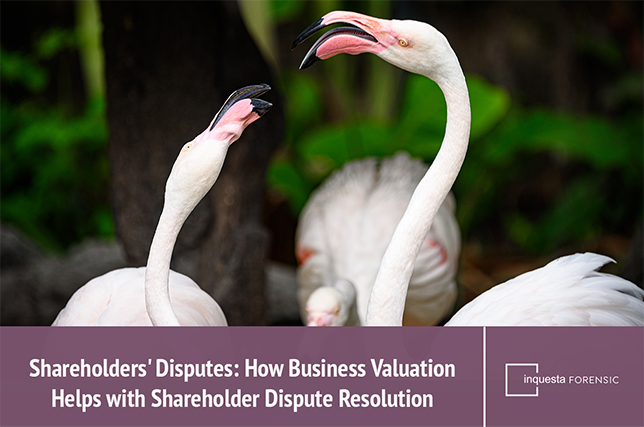“It was only a spreadsheet mistake.” are six words that may have preceded countless business failures, broken partnerships, and multimillion pound legal disputes. However, business valuation errors are far more than just academic miscalculations — they’re mistakes that can poison relationships, derail acquisitions, and devastate companies that took decades to build.
Whether you’re a seasoned entrepreneur preparing for an exit, a founder navigating your first round of investment, or an owner dealing with matrimonial proceedings, understanding the most common business valuation errors could be the difference between success and failure.
This guide reveals the 11 most costly valuation mistakes we encounter — while providing the practical strategies needed to avoid them in the first place.
The True Cost of Business Valuation Errors
From legal expenses incurred, to lost time and opportunities, and potentially unrecoverable damage to company reputation and relationship, when a business valuation goes wrong, the repercussions can extend far beyond simple numerical discrepancies.
The impact of business valuation mistakes include:
1. Direct Legal Expenses
Business valuation errors will typically trigger complex legal disputes that will likely require specialist expertise, such as:
- A forensic accountant in order to help quantify the discrepancies in valuation
- Testimony from an expert witness.
- Legal representation from commercial litigation solicitors.
A business valuation dispute can cost a company a significant sum of money in legal expenses — making it all the more important that you get it right first time.
2. Management Time and Lost Opportunities
Potentially even more damaging than direct legal expenses, can be the organisational chaos that often accompanies business valuation disputes. When valuation mistakes occur, senior management will often become pre-occupied with everything from resolving litigation matters to the immediate financial and legal consequences. As a result, critical business decisions can face significant delays.
This period of prolonged uncertainty can cause a downturn in company performance, and also affect solvency, as resources are diverted to managing issues surrounding the dispute. Additionally, while the focus is on litigation strategy, little or no attention is paid to business development, key talent acquisition, and capital investment — potentially causing lost market position.
These opportunity costs, while harder to quantify accurately when compared to legal fees, will frequently cause the most long-term damage to a business dealing with valuation mistakes.
3. Reputational Damage and Relationship Breakdown
Public cases of business valuation dispute will inevitably affect stakeholder confidence, often leading to:
- Hesitation from customers, potentially driving them to a competitor.
- Talent drain as key personnel consider their options in search of a more secure environment.
- Strained relationships with suppliers and additional restrictions on credit terms.
- Partnership dissolution and strain to family relationships — potentially also leading to a contentious matrimonial dispute in severe cases — only adding to an already stressful period.
11 Common Business Valuation Errors and How to Avoid Them
The process of accurately valuing a business is as much an art as it is a science — and getting it wrong can come with serious consequences. So, whether you’re preparing for investment, a sale, or planning for your future, even small missteps in the process can lead to serious consequences.
Below are 11 of the most common business valuation errors — complete with tangible real-world examples and practical solutions — to help you avoid costly mistakes and make more informed and confident decisions for your company’s financial future.

1. Using Inappropriate Valuation Methodology
- The Error: Utilising a valuation method that’s ill-suited to your business and its current predicament is a fundamental business valuation error.
- Example: Using a net asset valuation for a profitable and still-trading business rather than a future maintainable earnings approach, ignoring the value in a successful trading business.
- Solution: Consider instead utilising more than one valuation method at the same time. This can provide greater accuracy and security — minimising the chance of damaging business valuation errors..
2. Mixing Up Financial Metrics When Applying Multiples
- The Error: Utilising a correct valuation formula, but with the wrong financial metrics — such as applying an EBITDA (Earnings Before Interest, Tax, Depreciation, and Amortisation) multiple to profit figures that do not come under EBITDA.
- Example: If a company’s PBT (Profit Before Tax) is at £75,000 but its EBITDA is £100,000, applying the wrong multiple would lead to a significant undervaluation of the business.
- Solution: Be extremely careful to ensure you’re using the right measure of profit against the appropriate multiple.
3. Ignoring Market Conditions
- The Error: Completing a valuation without considering wider market trends and growth rates.
- Example: Valuing a company in a declining sector the exact same way as one in a booming industry, despite their contrasting markets.
- Solution: Stay well-informed on industry trends and research any recent deals in your sector to gain an understanding of what investors are actually paying for businesses like yours.
4. Creating Inflated Projections
- The Error: Presenting overly optimistic growth or revenue projections without any supporting evidence to indicate where your figures came from.
- Example: Forecasting 50% growth year-on-year for a business with little-to-no historical basis or market justification to support this.
- Solution: Use only realistic projections that are backed up by proven evidence and/or historical performance.
5. Overlooking Debts and Hidden Liabilities
- The Error: Valuing a business without factoring in the full picture concerning debts and liabilities.
- Example: Forgetting to account for lease obligations, possible litigation costs, or tax liabilities and focusing only on more obvious factors.
- Solution: Conduct a thorough and exhaustive review of your company’s liabilities and be 100% transparent about any factors that could limit the valuation. If you are struggling with the review, a forensic accountant will be able to assist and expedite the process with total accuracy.
6. Inadequate Documentation of Assets
- The Error: Failing to properly document all tangible and intangible assets. Commonly forgotten assets, leading to business valuation errors, include intellectual property (I.P.) and client contracts.
- Example: Overlooking the value of things like patents, trademarks, proprietary software, and customer databases.
- Solution: Maintain detailed records of all company assets. Also ensure that your IP is legally protected to enhance its value.
7. Comparing to Inappropriate Benchmarks
- The Error: By benchmarking your valuation against a vastly different company, in industry, size, scope, investment, etc., you set an unrealistic comparison for yourself.
- Example: A business just starting out comparing itself to the established market leaders.
- Solution: Focus attention only on comparable businesses in your industry.
8. Applying Inappropriate Tax Calculations
- The Error: Adopting an unnecessarily high tax rate when calculating post-tax valuation.
- Example: Applying dividend tax rates (up to 39.95%) rather than Capital Gains Tax rates (can potentially be as low as 10% with Business Asset Disposal Relief).
- Solution: Use tax rates that accurately reflect the expected deal structure, and factor in any applicable tax reliefs.
9. Fixating on a Single Valuation Method
- The Error: Relying solely on one valuation approach, be it because it was the one you intended to use going on or because it provides a more favourable-looking outcome.
- Example: Using only a discounted cash flow method due to potentially optimistic projections while ignoring market comparables.
- Solution: Use multiple valuation methods and create a more balanced view — providing a valuation range rather than one single figure.
10. Disconnect Between Funding Asks and Implied Valuation
-
- The Error: Asking for investment without checking if the implied valuation makes sense.
- Example: Requesting £100,000 for 5% equity from a prospective investor implies a valuation of £2 million — does this align with your company’s true worth?
- Solution: Always double-check your figures and ensure your funding asks align with a realistic and justifiable valuation.
11. Valuing Too High Too Early
- The Error: Setting an overly ambitious valuation too early — especially without the requisite revenue as justification.
- Example: Valuing solely based on future potential rather than current performance.
- Solution: Consider postponing valuation until you can support a higher figure.
The Role of Forensic Accountants in Preventing Valuation Disputes
When it comes to business valuations, precision, transparency, and defensibility are key — especially when the stakes are high. Forensic accountants play a crucial role in safeguarding the valuation process and identifying potential issues before they can escalate and become costly disputes.
The unique combination of investigative expertise, financial acumen, and legal awareness possessed by forensic accountants enables them to navigate even the most complex of valuation scenarios with total confidence and clarity. Strengths forensic accountants can bring on a valuation include:
- Keen investigative skills necessary to identify undisclosed information.
- Astute understanding of legal standards and requirements.
- Experience supporting individuals and legal professionals to undertake accurate company valuations, as well as deal with disputes that can arise from business valuation errors.
- Communicate with necessary clarity to clearly explain even highly complex financial concepts.
- Experience to see early signs of possible disputes.
Generally, the earlier you involve a forensic specialist when looking to value your company, the better. A forensic accountant will be able to identify possible areas of issue and proactively address them before they can escalate into a formal dispute.
Protecting Your Business from Valuation Errors
Business valuation errors can lead to potentially debilitating disputes, with often persistent and far-reaching consequences. By better understanding some of the common pitfalls and implementing robust processes, you can significantly reduce your risk and potential exposure.
Whether you’re preparing for investment, navigating a divorce involving a business, or are planning an exit from the company, an accurate business valuation built on a foundation of realism and appropriate methodologies will protect you and your stakeholders from the potentially substantial costs of business valuation mistakes.
With proper preparation and expert guidance, you can navigate the complex valuation landscape with total confidence — ensuring that your business’s value is a fair and legally defensible representation . For more information about how Inquesta Forensic can support your business valuation, get in touch today.
This article was created by Inquesta Forensic, specialists in forensic accounting and business valuation services. It is not intended as formal legal advice and should not be considered as such. For personalised advice regarding your specific business valuation needs, speak to a professional today.
- Your Partner’s Been Convicted: Can They Take Your House? What Section 10a POCA Means For You
- The Essential Role of Forensic Accounting in High Net Worth Divorce
- How to Value a Startup Business: A Guide for UK Entrepreneurs
- Pig Butchering Scams: Guide to Crypto Romance Fraud
- Shareholders’ Disputes: How Business Valuation Helps with Shareholder Dispute Resolution











